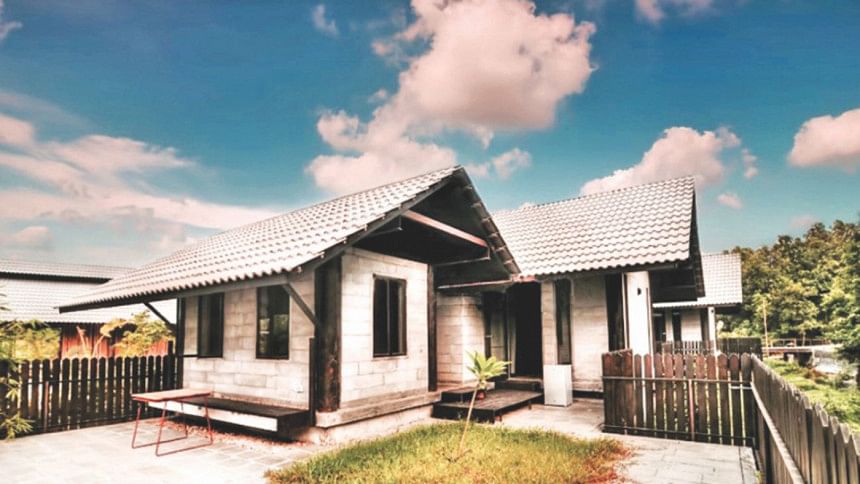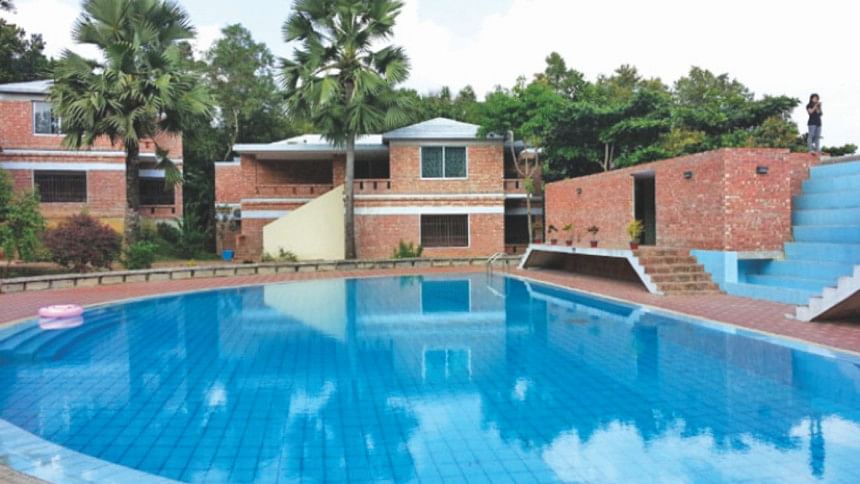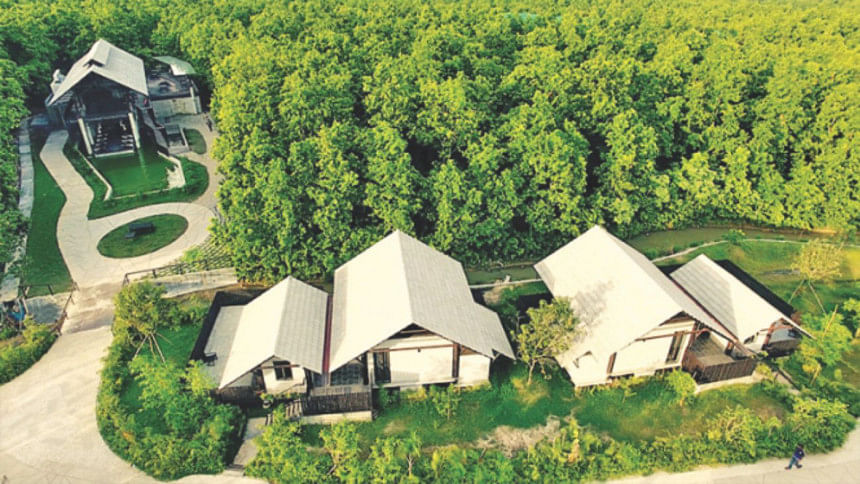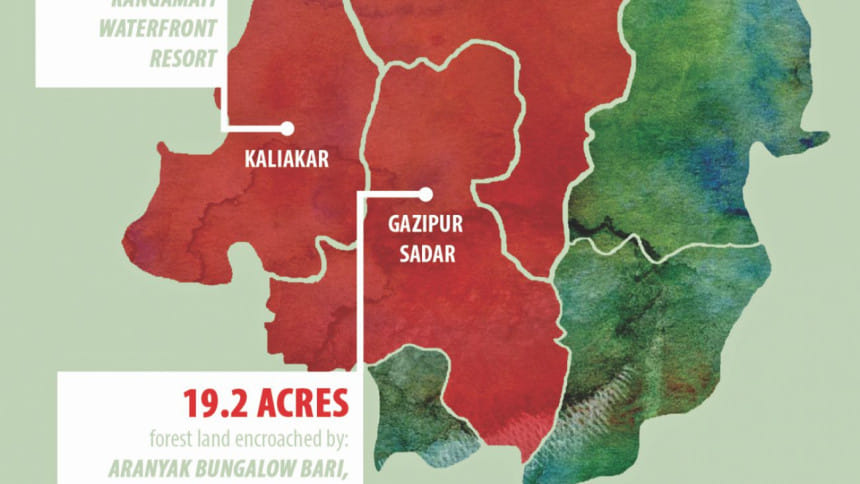Gazipur's Resorts: Not out of the Woods yet

Just about 50 kilometres north of Dhaka lies the wooded surrounds of Gazipur, a district that has become increasingly popular these days because of its luxurious resorts that offer the guests a chance to get lost in nature's serenity and leave behind the big-city stress.
However, it needs to be asked whether these resorts are kind to the very nature they use as a selling point. Or have they just been illegally set up near the forest for profit and are instead harming the environment?
Let's have a look.
Section 12 of the Bangladesh Environmental Conservation Act, 1995, mandates that every establishment must have a clearance certificate from the Department of Environment. Surprisingly, however, according to the Department of Environment, till date, none of these resorts in Gazipur have been established with a clearance certificate.
Md Abdus Salam, DoE senior chemist of Gazipur district office, informs that although there is a legal obligation to take the clearance for orange B-category establishments (colour coded according to their impact on the environment), no resort in Gazipur has a clearance certificate.
“We have issued letters to resort owners so that they can complete the process to get a clearance, such as demarcating their land, submitting the No Objection Certificate (NOC) and joint visit report with the forest department, but as far as I know, none of the resort owners have cleared these requirements,” he says. “We send the list of these resorts to our monitoring and enforcement cell to take action against them.”

Star Weekend contacted the monitoring and enforcement cell of DoE but unfortunately could not find any specific information about what actions are usually taken against resorts without a clearance certificate. Making the picture even murkier is the fact that, according to Md Ashraf Uddin, director of DoE's monitoring and enforcement cell, there is no record available of actions taken against resorts that have not procured clearance certificates—even though they are supposed to maintain a regular record of their activities.
“The lists and necessary information first come to the Dhaka region director of DoE and after examining that, they send us for enforcement,” he says.
When contacted, Subol Bose Moni, director of the Dhaka region, claims that he does not receive any listed information on Gazipur resorts and that the reports he receives are all sent to the monitoring and enforcement cell without any examination. When asked when he had last gotten a report about a resort having no clearance, he admits: “I cannot recall any file regarding resorts has been submitted to the monitoring and enforcement cell in the last three to four months.”
The above comments from DoE officials raise questions about their efficacy and accountability—how have resort owners been engaging in booming business without procuring any clearance certificates, which they are obliged to do by law? Why is there no record of any action ever being taken by the DoE? It is also clear that the DoE lacks minimal inter-departmental coordination and it has become a major reason behind resort owners escaping sanctions and doing business illegally.

Nearly 24 acres of forestland have been encroached by 15 resorts
Not only do these resorts lack clearance certificates from the DoE, there are allegations that a total of 15 resorts, picnic and shooting spots, rest-houses and bungalows have encroached into nearly 24 acres of forestland in Gazipur. The data was found from the two divisions—Dhaka Forest Division and Wildlife Management and Nature Conservation Division—responsible for maintenance of the forestlands of Gazipur.
For example, the Dhaka Forest Division data shows that at least seven resorts, guesthouses and rest-houses, picnic spots and shooting spots have encroached upon at least 5.13 acres of land. The 'Sohag Palli and Picnic Spot, Sinaboh, Kaliakoir', has encroached 2.4 acres, 'Rangamati Water Front Resort, Kaliakoir', has encroached 1 acre and 'Nuhash Polli' has encroached upon 0.60 acres of forest land.
On the other hand, under the Wildlife Management and Nature Conservation Division, nearly 19 acres of land have been eaten into by eight resorts, picnic and shooting spots. Of them, 'Sabah Garden Picnic Spot' has trespassed at least 7.89 acres into forestland, 'Marina Park and Resort Ltd' has encroached 4.67 acres, 'Bhawal Resort Ltd.' has 3.68 acres and Greentech Resort and Convention Centre' has encroached 0.54 acres.
According to ASM Jahir Uddin Akon, divisional forest officer of Wildlife Management and Nature Conservation Division, the grabbing of forestland was at its peak in the 1980s, when many grabbed forestland intentionally. Additionally, since the boundary determination process had not developed yet, many people occupied the forestland in order to keep their property on a straight strip. Later, after the Revisional Survey was held to revise the acreage information as well as update the names of the owners and possessors, the ownership of land in the forest area changed as people claimed land as their own. Crucially, the Forest Department of the day could not help the survey department by providing the necessary information about the possessors of land, as it was a small department.
“This is another reason why resort owners from other areas bought land in the wrong places, without knowing the complexities of the land properly,” he says.
But according to locals, in most cases the resort owners bought low-lying land from private owners, filled it with loose soil to bring it to level with the forestland, and then outlined their own area by including some land from the nearby forest in the bargain.
“It is easier to grab the forestland, as these lands are not demarcated from private land,” says Tahmidul Islam, one of the locals at Kaliakoir. “Many of these resorts have cleared sal forests to construct roads to their resorts, replacing the narrow walkways of the forest.”

Blame game while making them encroachment-free
When the Forest Department finds anyone grabbing land for resorts or other establishments, they basically file a preliminary offence report (POR) against them. However, in order to liberate a land from encroachment by resort owners, the FD usually sends the list of offending resorts to the deputy commissioner of that district so that an eviction case can be filed against them. But according to the two responsible divisions of forest, the process takes years to play out.
And there are bureaucratic stumbling blocks aplenty. According to the Dhaka Forest Division, a total of 15 names have been sent to the deputy commissioners of Gazipur, but deputy commissioner Dewan Muhammad Humayun Kabir informs that he has not received any information about illegal resorts from the two divisions.
“We have even issued a letter to them this February asking them to provide the necessary information of those resorts in a given format, but they haven't sent us any yet. What can we do when they are the owners of the forests?” he asks.
The DC also mentions that there are even gunmen to protect the forest. “What did they do when an illegal establishment is built right in front of their eyes? Both of the forest divisions come to us once an infrastructure is already built, and ask us to make the lands free of encroachment. And whenever the illegal owners go to court, the forest division never supervises any case, for which it takes years,” says the DC.
However, a number of locals allege that these influential owners have been doing business here by grabbing forestlands by pleasing both the forest department and the local district administration office. In fact, on April 26, the Anti Corruption Commission (ACC) called three resort owners of Gazipur—Abdul Jalil (owner and managing director of Sohag Polli Picnic Spot), Rafiqul Islam (owner of Rangamati Waterfront Resort) and Sohel Ahmed (owner of Aronnok Banglow Bari, Gazipur)—as part of an investigation on illegally occupying forestland in Gazipur.
Star Weekend also contacted these three owners, but could not reach any of them after repeated attempts. However, Star Weekend did manage to talk to Sohag Polli Picnic Spot general manager Shahid Ahmed, who claimed he had no knowledge of where his MD was. He, however, admitted that there was “some land related problem” and at one point pointedly asked the reporter whether she could help them “solve it”.
Shah Jalal Uddin Ahmed, Managing Director of Greentech Resort and Convention Center, meanwhile, refuted the allegation of the Forest Department. “The decision should come from three parties—the Forest Department, a neutral body and me. I bought and demarcated my land around 30 years ago, but now they are saying that I have occupied their land. If someone claims that he has land inside my house, why should I accept this?” he asks.
Ahmed also remarks that the Forest Department is doing this to grab some extra money. “There is no land in Gazipur where they don't make pointless claims for a few extra bucks,” he states.

Booming resorts creating environmental impact
Have we ever wondered whether these luxury resorts have risked the wellbeing of the forest land and created an ecological imbalance? Dr M Maksudur Rahman, professor, Department of Geography and Environment, University of Dhaka, sheds light on how a resort in a deep forest disturbs the ecosystem of that very area. “When a resort is made near a forestland, it causes harm to species that call these areas home. The constant noise generated by the vehicles coming to these resorts creates sound pollution and causes distress for both humans and wildlife,” he says. “Biodiversity doesn't only mean proliferation of plant species; we have to ensure that animals too can roam freely.”
Also, many of these resorts plant exotic foreign species for beautification, but these may be in conflict with indigenous plant species. For example, when we plant eucalyptus instead of Sal or Goran, it does not actually go with our forest.
It is generally assumed that resorts are pretty environment-friendly and do not harm the environment significantly. But when an establishment, be it an industry, resort, picnic spot or even a thatched hut, is built in a forestland, it is a violation of law.
“The area of Gazipur has already become an environmentally critical one and we should be more sensitive and responsible while creating an establishment there. And when we clear forests in the name of creating resorts or any other intervention, we must ensure the mitigation plan too,” says Iqbal Habib, joint secretary of Bangladesh Poribesh Andolon (BAPA).
Besides, the rate at which resorts and recreational places are increasing near forests, environmentalists fear that it will gradually become a commercial area, as small and medium businesses always flourish in the wake of tourism.





Comments